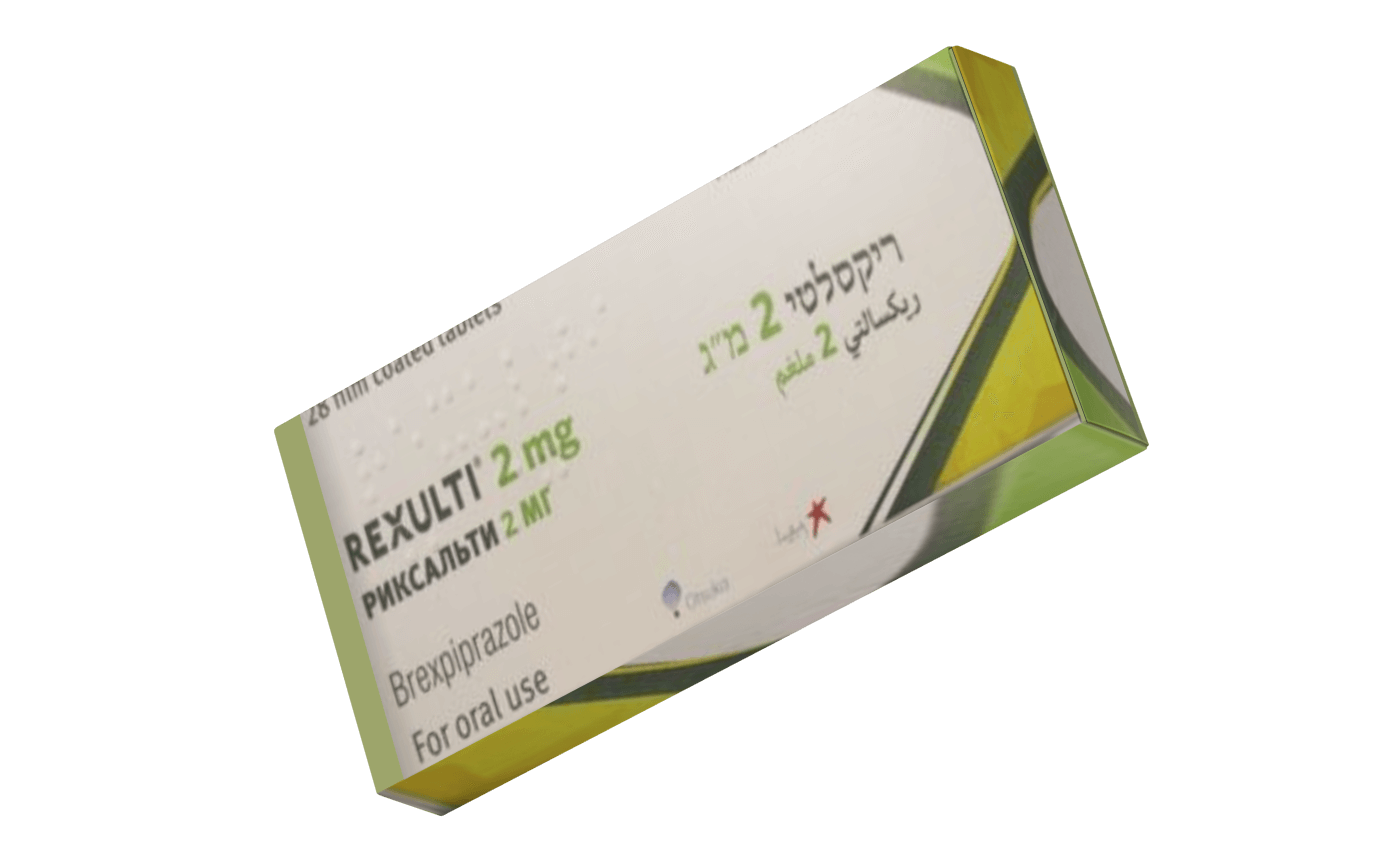Rexulti / Brexpiprazole (generic name: brexpiprazole) is an oral drug prescribed for the treatment of schizophrenia in patients 13 years and older. It may also be prescribed to treat adults with major depressive disorder (MDD) as an adjunctive treatment to other antidepressants.
Brexpiprazole is a part of a therapeutic drug group called ‘atypical antipsychotic drugs’ that work by helping modulate the secretion of serotonin and dopamine from the receptors in the brain. This pharmacological profile provides benefits in mood stabilization and behavioral management.
Brexpiprazole also offers a treatment option for adults with schizophrenia and agitation associated with Alzheimer’s disease.
Caution
Tell your healthcare provider if you become pregnant or think you have become pregnant during treatment with Rexulti, since it can harm an unborn baby. Taking brexpiprazole during the third trimester of pregnancy may cause the baby to have abnormal muscle movements or withdrawal symptoms after birth.
Patients and their family members should be on alert for signs of worsening depression, suicidal thoughts, or other mood changes. Consult with a doctor if the person is showing any inclination towards self-harm.
Dosage
Rexulti is administered orally, with or without food. Dosage varies based on the condition being treated:
- MDD (for adjunctive treatment): A starting dose of 0.5 mg to 1 mg once daily, with a target dose of 2 mg/day.
- Schizophrenia: A starting dose of 1 mg once daily, with a target dose of 2 to 4 mg/day.
- Agitation in Alzheimer’s Disease: A starting dose of 0.5 mg once daily, titrated to a target dose of 2 mg/day.
Dosage adjustments can be be made by a doctor, based on your response and tolerability. Even if there is an improvement in your condition, do not stop the treatment without first talking to the doctor.
Do not divide the tablet. The tablets do not have a score/dividing line and therefore the tablets cannot be split into equal doses.
Storage
If in any doubt, consult our blog on safe medicine management. Store below 30ºC / 82ºF in the original packaging, away from light and moisture.
Common Questions About Rexulti / Brexpiprazole
Are there any off-label uses for Rexulti?
A doctor may prescribe the drug
off-label for anxiety other than in Alzheimer’s patients. In dosages of up to 4 mg per day, it has been shown to also treat bipolar disorder in adults.
What are the unusual urges of Rexulti?
According to the comapny’s website, some people taking the drug have experienced strong unusual urges that cannot be controlled. These included compulsive gambling, sexual urges, shopping, and binge eating.
Does brexpiprazole help with anger?
Clinical studies have indicated that brexpiprazole may help reduce irritability and anger symptoms in patients with major depressive disorder. Its work in managing agitation associated with Alzheimer’s disease further supports its role in addressing such behavioral disturbances.
Does brexpiprazole cause weight gain?
Yes, weight gain is a common side effect of brexpiprazole. In clinical trials, patients experienced an average weight gain of approximately 3.1 kg (6.8 lbs) over one year. Regular monitoring of weight is recommended.
This text is for informational purposes only. Please consult a doctor or pharmacist before using any medication.
Read the information leaflet that comes with the medication.
Most people who use Rexalti do not experience any adverse side effects. Doctors prescribe this medication because they assess the benefits of such treatment outweigh any likely unwanted effects.
There are possible serious side effects that may occur while using this medication:
- In elderly patients with dementia-related psychosis, there is an increased risk of death
- Increased levels of suicidal actions and thoughts
- Issues with body temperature regulation, feeling too warm.
- Involuntary, repetitive body movements (tardive dyskinesia) that may become permanent.
- Metabolic changes such as increases in blood sugar, cholesterol, and triglyceride levels.
Some of the common side effects that have been reported include:
- Headaches
- Tiredness
- Restlessness and an urge to move (akathisia)
- Dizziness
- Increase in appetite and weight
- Anxiety
- Constipation
- Diarrhea
- Nausea
Not all side effects are listed here. If these or other unlisted symptoms persist or worsen, consult a healthcare provider or pharmacist.
Major Depressive Disorder (MDD)
Brexpiprazole is approved as an adjunctive treatment for adults with MDD who have had an inadequate response to antidepressant therapy. Clinical studies have demonstrated that adding brexpiprazole to existing antidepressant regimens can lead to significant improvements in depressive symptoms, including mood, sleep disturbances, and irritability.
Schizophrenia
For adults and adolescents aged 13 years and older with schizophrenia, brexpiprazole has been shown to reduce both positive symptoms (e.g., hallucinations, delusions) and negative symptoms (e.g., social withdrawal, lack of motivation). Its favorable side effect profile, particularly regarding extrapyramidal symptoms, makes it a viable option for long-term management.
Agitation in Alzheimer’s Disease
In May 2023, the FDA approved brexpiprazole for the treatment of agitation associated with dementia due to Alzheimer’s disease. This approval was based on clinical trials demonstrating its efficacy in reducing agitation symptoms such as restlessness, verbal outbursts, and physical aggression. Brexpiprazole is the first medication approved for this specific indication.













